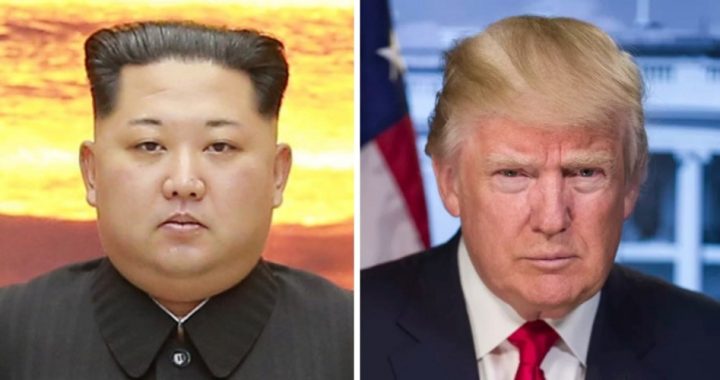
South Korea’s government issued a statement on April 29 saying that North Korea’s leader, Kim Jong-un, had told South Korea’s President Moon Jae-in that he would abandon his nuclear weapons program if the United States agrees to formally end the Korean War and promises not to invade his country.
After the summit between the two Korean leaders on April 27, President Trump tweeted: “Korean War to end. The United States and all of its great people should be very proud of what is now taking place in Korea.”
While the fighting in the 1950-1953 Korean War ended with the signing of an armistice agreement on July 27, 1953, that agreement created a ceasefire amounting to a de facto military stalemate, but not a formal end to the war, a de jure state of which still exists. That agreement was signed by U.S. Army Lieutenant General William Harrison, Jr. representing the United Nations Command (UNC), North Korean General Nam Il representing the Korean People’s Army (KPA), and the Chinese People’s Volunteer Army (PVA). For more than half a century, thousands of American soldiers have remained in South Korea, where any attack on the Sourth would pull American into the new round of fighting, without Congress being able to make the decision to go to war, as required by the Constitution.
The Korea Herald reported on April 29 that Kim told Moon during the summit that there would be no need for him to maintain a nuclear arsenal if the two Koreas formally ended the war and signed a nonaggression pact.
The Herald noted that in addition to affirming the two Koreas’ will for the “complete denuclearization of the Korean Peninsula,” Kim and Moon agreed to declare a formal end to the 1950-1953 Korean War within the year, establish a cross-border hotline, pursue phased arms reduction, cease hostile acts and expand inter-Korean exchanges.
Just two days after the historic summit between Moon and Kim, the North Korean leader promised to close down his country’s main nuclear test site at Punggye-ri in May and allow the shut-down to be witnessed by security experts and journalists from South Korea and the United States.
On Fox News Sunday on April 29, the program’s host Chris Wallace asked National Security Adviser John Bolton about what level of elimination of North Korea’s nuclear facilities the Trump administration would demand before the United States begins to relieve its economic sanctions against Pyongyang.
Wallace asked:
Will President Trump insist that Kim give up, ship out, all of his nuclear weapons, all of his nuclear fuel, all of his ballistic missiles, before the U.S. makes any concessions?
To which Bolton replied: “Yes, I think that’s what denuclearization means.”
Wallace continued by asking: “But just to pin this down, North Korea has to give up basically it’s a whole program before the U.S. begins to relieve economic sanctions?”
Bolton replied: “Yes. I think that the maximum pressure campaign that the Trump administration has put on North Korea has, along with the political military pressure, has brought us to this point.”
Wallace then referred the joint statement from the two Koreas on April 27 that called for “a nuclear-free Korean peninsula and some people have suggested the North Koreans will give up everything they’ve got. But in return, the U.S. would agree that we are not going to allow any nuclear-armed airplanes or nuclear-armed ships on the Korean peninsula.”
Wallace asked Bolton if this was acceptable to the United States and Bolton replied “Well, we certainly haven’t made that commitment. And again, I’m looking at the Panmunjom declaration as they call it in the context of a series of earlier North-South Korean agreements. And again, looking at the 1992 joint declaration, when they said nuclear-free, they meant with respect to the two Koreas.”
Asking for clarification, Wallace asked “So, you don’t view this as involving any kind of commitment from the U.S.?”
Bolton answered: “I don’t think it binds the United States, no.”
Given Kim’s past reputation as a hardliner, it is difficult to envision the North Korean agreeing to any denuclearization of the Korean Peninsula that does not include a U.S. commitment to eliminate U.S. nuclear-armed planes and ships from the area.
The Korea Herald quoted a statement from Alexander Vershbow, a distinguished fellow at Scowcroft Center for Strategy and Security and former U.S. ambassador to South Korea that explored those possibilities:
It remains to be seen what Kim Jong-un’s commitment to denuclearization means in concrete terms: whether it foreshadows agreement to President Trump’s demand for the rapid and verifiable elimination of the North’s nuclear weapons, delivery systems and infrastructure; or whether the North envisages a drawn-out process tied to potentially unacceptable demands that the U.S. withdraw its forces from the South or provide immediate sanctions relief, while the North’s nuclear threat remains in place. [Emphasis added.]
Bolton’s statement that the United States is making no commitment to withdraw any nuclear-armed planes or ships from the Korean peninsula may prove to be a deal breaker when Kim and Trump meet in the near future.
There is even less chance that Trump would accede to demands from Kim (should Kim be so bold as to make them) to remove all U.S troops from South Korea in exchange for the North’s dismantling of its nuclear program. American noninterventionists have been urging exactly such a change in U.S. policy for years and have been ignored by the establishment forces that have dominated Washington under both Republican and Democratic administrations.
Photos: North Korean leader Kim Jong-un and President Trump
Related articles:
North Korea Not Interested in Diplomacy Until It Has ICBM Capable of Reaching U.S. East Coast
Trump Imposes More Sanctions on North Korea, Calls Kim “Madman”



